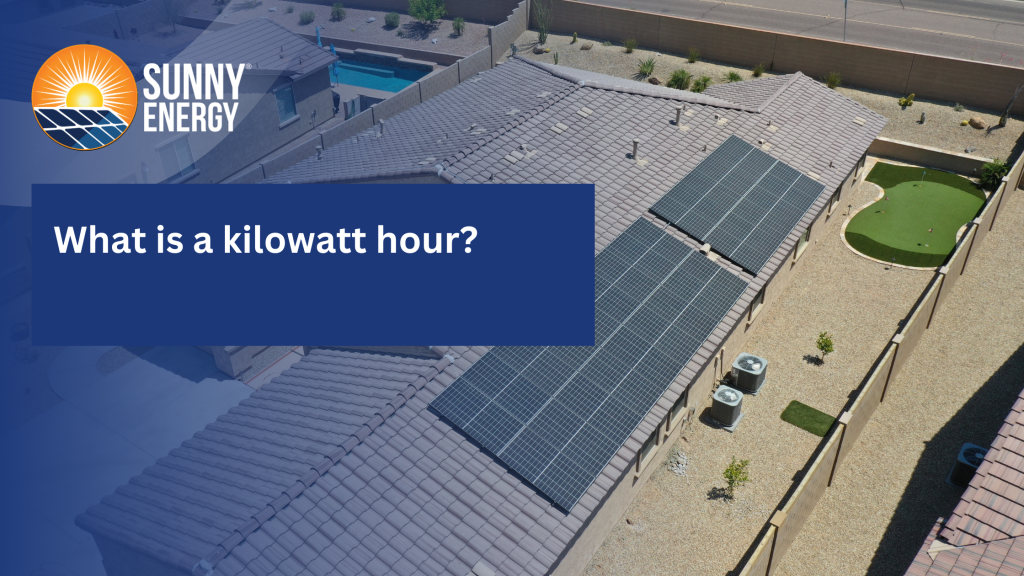The terms watt, kilowatt and kilowatt-hour are related units of measurement yet different. In this blog we will understand the terms watt, kilowatt and kilowatt hour, along with its significance in solar energy and difference between kilowatt vs kWh. In the end we will also discuss how a solar installer and one of the top rated solar companies in Arizona.
Understanding the terms:
1. Watt:
A watt (W) is the standard unit of power in the International System of Units (SI). It measures the rate at which energy is transferred or the rate at which work is done. One watt is defined as one joule per second. In the context of electricity, it quantifies the amount of electrical energy used or produced per unit of time.
2. Kilowatt:
A kilowatt (KW), is a unit of power which quantifies the rate at which electrical energy is either consumed or produced. One kilowatt is equivalent to 1,000 watts, providing a standardized measure for various devices and systems. For instance, if a home appliance has a power rating of 2 kilowatts, it utilizes 2,000 watts of electrical power.
3. Kilowatt-hour
The kilowatt-hour (kWh), is a unit of energy used in the measurement and billing of electricity consumption. It signifies the total amount of electrical energy consumed or produced over a specified period. Specifically, one kilowatt-hour corresponds to the consumption of one kilowatt of power for one hour. This unit is fundamental in determining the overall energy usage by devices and systems over time, facilitating accurate billing and resource management. For example, if a light bulb with a power rating of 60 watts is left on for 5 hours, it would result in an energy consumption of 0.3 kilowatt-hours.
Significance of kilowatt vs kWh in solar energy
In the realm of solar energy, kilowatt vs kWh determines the capacity and performance of a solar installation. The capacity of a solar panel system is measured in kilowatts (kW), indicating its maximum power output under optimal conditions. This metric is crucial for sizing a solar installation to meet the energy needs of a household or business.
On the other hand, kilowatt-hours (kWh) quantify the actual energy production or consumption over time. For solar energy systems, kWh represents the amount of electricity generated by the solar panels. To know the difference between kilowatt vs kWh metric is essential for assessing the economic and environmental impact of a solar installation, as it directly correlates with utility bills and carbon footprint reduction. Both kilowatt vs kWh are equally important.
Difference between kilowatt vs kWh
The terms kW and kWh are related concepts but represent different aspects of electricity and energy. Kilowatt vs kWh represents the difference between the capacity of solar power and rate. kW is often used to express the capacity or size of a solar power system. It indicates the maximum amount of power the system can produce under optimal conditions. Whereas kWh is used to measure the actual energy production or consumption over time. It is the product of power (kW) and time (hours). kW measures the rate of energy production or consumption at a specific moment, while kWh measures the total energy produced or consumed over a period. Expressed in kW, solar panel capacity indicates the maximum power output the solar panels, at Standard Test Conditions, can provide. kWh, reflects the actual energy generated by the solar panels over a specific period, considering variations in sunlight, weather conditions, and system efficiency.
How do peak sun hours impact efficiency?
Arizona’s solar landscape benefits greatly from the state’s abundant peak sun hours, averaging around 300 days of sunshine annually. The intense and direct sunlight during peak hours significantly influences the efficiency of solar panels, allowing for optimal energy production. The high intensity of the sun, especially during the summer months, contributes to increased solar panel efficiency, translating into substantial electricity generation. In Arizona, strategic system design becomes crucial to maximize exposure during these peak sun hours, ensuring solar installations are oriented correctly and remain free from shading. The state’s favorable solar policies and incentives, combined with consistent sunshine, make solar energy an economically viable and environmentally friendly option.
How is Sunny Energy maximizing solar efficiency?
As a leading solar installer, Sunny Energy a leading company in solar power Tucson and solar company in Phoenix recognizes the importance of precise system sizing and strategic placement. Sunny Energy is a leading solar company in Phoenix and their expert team leverages cutting-edge technology to assess peak sun hours in a specific location, ensuring that solar installations are optimized for maximum efficiency and performance. By customizing solar solutions based on individual energy needs and local conditions and kilowatt vs kWh. Sunny Energy as best solar company in Arizona empowers clients to harness the full potential of solar energy, contributing to a sustainable and cost-effective energy future and considers as one of the trusted solar power companies in Arizona.
In conclusion, comprehending the nuances of kilowatt vs kWh, and recognizing the impact of peak sun hours on solar efficiency, is essential for anyone considering a switch to solar energy. With Sunny Energy’s expertise and commitment to excellence, you can embark on your solar journey with confidence, knowing that your installation is tailored to deliver optimal performance and environmental benefits.




